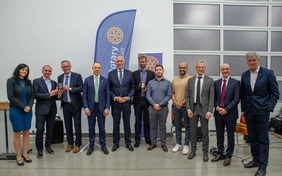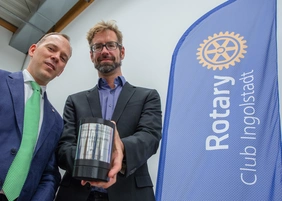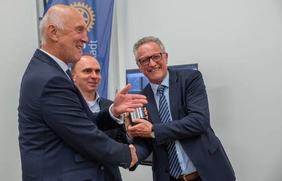As in 2021, two research groups from THI were once again delighted to receive the award from the Ingolstadt Rotary Club. The team led by Professors Michael Botsch, Andreas Festag, Werner Huber, and Stefanie Schmidtner with their mobility project "KIVI" and the junior research group "I-BasE" led by Dr. Meinert Lewerenz prevailed in a top-class field of applicants. They convinced the expert jury consisting of THI President Professor Walter Schober, Professor Georg Rosenfeld, former President Professor Gunter Schweiger, and Professor Daniel Großmann.
"I am pleased that today we can honour scientists who have made outstanding achievements in particularly promising fields," THI President Schober emphasised at the ceremony in the INNO-Park. "For us at THI, applied research plays an extremely important role. We are among the universities of applied sciences with the strongest research." He said that not only the nationwide leading scientific centre for vehicle safety CARISSMA is a clear sign of this, but also the two doctoral centres that the THI is the only university in Bavaria to have been given sole responsibility for as a so-called seat university.
The award-winning project "KIVI" is located in one of the THI's core areas: mobility. In close cooperation with AININ, the Fraunhofer IVI Application Centre and the city of Ingolstadt, a high-definition test field was set up to research innovative mobility applications in urban areas. Three high-load intersections were equipped with precise laser detection systems, thermal cameras and route stations with AI algorithms and cyclist warning functions. The data thus obtained serves as a basis to increase safety and improve traffic flow.
The "I-BasE" junior research group, which also received an award, has achieved results relevant to the global transport and energy transition. It is developing accelerated ageing tests for lithium-ion cells, which are interesting for manufacturers of battery storage systems, as they enable a quick and reliable assessment of the quality and durability of the cells. Being able to realistically assess ageing processes is also of great importance for the automotive industry. This is because battery storage systems will have the status of a key technology in the future - and thus be an important component of German energy and economic policy.
The Rotary Club of Ingolstadt has been awarding the Rotary Research Prize through its sponsoring association Rotary Stipendium Ingolstadt e.V. since 2021, alternating annually between the Ingolstadt campuses of the Ingolstadt University of Technology and the Catholic University of Eichstätt-Ingolstadt. In 2021, the prize was awarded for the first time at Ingolstadt University of Technology.
The Rotary Research Award is aimed at scientists who provide innovative impulses for further societal, social, technical, economic or ecological development. The selection criteria include scientific quality and relevance of the research, degree of innovation, potential contribution to solving concrete challenges as well as the degree of maturity and probability of realisation of the research results.




![[Translate to English:] Logo Akkreditierungsrat: Systemakkreditiert](/fileadmin/_processed_/2/8/csm_AR-Siegel_Systemakkreditierung_bc4ea3377d.webp)








![[Translate to English:] Logo IHK Ausbildungsbetrieb 2023](/fileadmin/_processed_/6/0/csm_IHK_Ausbildungsbetrieb_digital_2023_6850f47537.webp)


